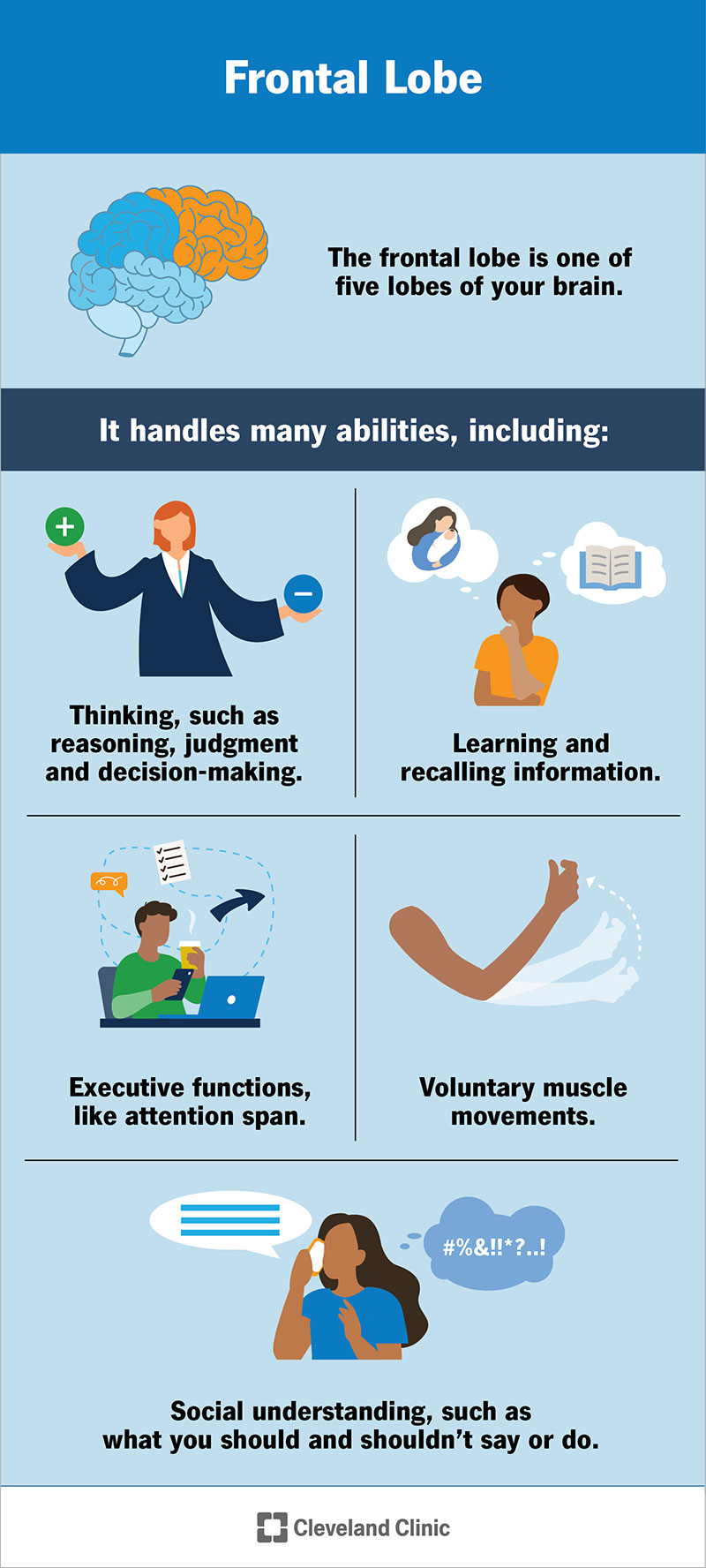Your brain’s frontal lobe is home to areas that manage thinking, emotions, personality, judgment, self-control, muscle control and movements, memory storage and more. Just as its name indicates, it’s the forward-most area of your brain. Your frontal lobe is a key area of study for both brain-related and mental health-related fields of medicine.
Advertisement
Cleveland Clinic is a non-profit academic medical center. Advertising on our site helps support our mission. We do not endorse non-Cleveland Clinic products or services. Policy
The frontal lobe is one of five lobes of your brain. This section of your brain works cooperatively with many other brain areas, giving you a wide range of abilities. Anything you do that involves thinking or conscious action relies on abilities contained within your frontal lobe.
Advertisement
Cleveland Clinic is a non-profit academic medical center. Advertising on our site helps support our mission. We do not endorse non-Cleveland Clinic products or services. Policy

Image content: This image is available to view online.
View image online (https://my.clevelandclinic.org/-/scassets/images/org/health/articles/24501-frontal-lobe)
Your frontal lobe handles many abilities, including:
As the name suggests, the frontal lobe is at the front of your head. It’s the section of your brain just behind your forehead.
Experts estimate that the frontal lobe makes up between 25% and 40% of your brain’s cerebral cortex. (The estimated range is wider because your brain doesn’t have clear boundaries between areas, so different studies used different ways to define the boundaries.) The word “cortex” comes from Latin and means “tree bark.” The cortex is the wrinkly-textured outer surface of your brain.
Advertisement
Your frontal lobe consists of the same specialized cells found throughout your brain. The basic cell types are:
Any condition that can affect your brain tissue can affect your frontal lobe. There are also some neurodevelopmental (brain development-related) conditions that specifically involve frontal lobe effects and symptoms. Conditions and symptoms that can affect your frontal lobe include:
There are dozens (if not more) of possible signs and symptoms of frontal lobe conditions. These signs and symptoms can vary widely for two reasons:
While the list of symptoms that can affect your frontal lobe is long, there are a few types of symptoms that are especially common. These include:
There are many ways healthcare providers can check the health of your frontal lobe. These include diagnostic tests, lab tests, imaging scans and more. Examples include:
Advertisement
The treatments for frontal lobe-related conditions can vary even more widely than the conditions they treat. Your healthcare provider is the best person to tell you about the treatments that are possible and that they recommend.
You can do many things to maintain the health of your entire brain, including your frontal lobe. Some brain-related conditions are preventable. Others aren’t preventable, but you may be able to reduce your risk of developing them. Some things you can do to maintain your brain health include:
Advertisement
Your frontal lobe contains brain areas that manage who you are — especially your personality — and how you behave. Your ability to think, solve problems and build social relationships, sense of ethics and right vs. wrong all rely on parts of your frontal lobe.
Experts know this because of a railroad foreman named Phineas Gage. In 1848, an accidental explosion at a railroad construction site propelled an iron rod through Gage’s head, destroying the left side of his frontal lobe. Before the accident, Gage was a calm, respected leader among his coworkers. Gage survived, but after the accident, his personality changed. He would lose his temper, act disrespectfully and constantly use profanity.
However, Gage’s personality changes weren’t permanent. Four years after his accident, Gage moved to Chile in South America and became a stagecoach driver. Somewhere in late 1858 or early 1859, a doctor who examined Gage said he was physically healthy and showed “no impairment whatever of his mental faculties.”
While Gage mostly recovered from the accident, he died from seizures in San Francisco in 1860. The seizures were very likely the result of damage from the accident. However, his case remains one of the most useful in modern medicine’s understanding of what the frontal lobe does, especially when it comes to your personality.
Advertisement
When you think about your frontal lobe, you’re telling a part of your brain to think about itself. Your frontal lobe is one of the most important sections of your brain. It controls or manages many abilities you use throughout your everyday life. It’s also home to areas that control your personality, emotions, judgment and more. Caring for your frontal lobe and getting treatment for conditions that affect it can make a big difference in how it works and contributes to your life.

Sign up for our Health Essentials emails for expert guidance on nutrition, fitness, sleep, skin care and more.
Learn more about the Health Library and our editorial process.
Cleveland Clinic’s health articles are based on evidence-backed information and review by medical professionals to ensure accuracy, reliability and up-to-date clinical standards.
Cleveland Clinic’s health articles are based on evidence-backed information and review by medical professionals to ensure accuracy, reliability and up-to-date clinical standards.
If you have a neurological condition, you want expert advice. At Cleveland Clinic, we’ll work to create a treatment plan that’s right for you.
